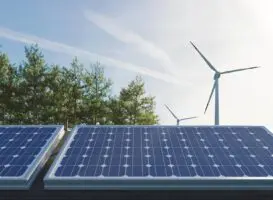The truth is out: You can’t drive a car with a wind turbine on it (although try telling that to these guys – video below). The harsh reality was served up this week by US Republican presidential candidate Mitt Romney, in an effort to galvanise his calls to boost US fossil fuel production, and to undermine Barack Obama’s calls for a shift away from fossil fuel dependence and towards renewables. In what Yahoo News describes as a “blistering opinion piece,” published in an Ohio newspaper on the eve of the Super Tuesday primaries, Romney accused the Obama of retreating into an “imaginary world” of renewable energy instead of focusing on oil and gas as the route to becoming the world’s leading energy superpower.
“America is an energy-rich nation, and it is time we stopped living like an energy-poor one,” he wrote in the Columbus Dispatch. “As president, I will unleash American innovation and productivity to make full use of our natural resources,” he said, adding that he would “pursue dramatic regulatory reform to accelerate the exploration and development of oil and gas, to facilitate construction of vital infrastructure and to preserve and expand crucial electricity capacity.” And while solar and wind are “fine,” said Romney, they’re also “very expensive and you can’t drive a car with a windmill on it.” Clearly he’s never heard of Radotec – who’s in an imaginary world now?
Obama’s green drive
Meanwhile, Barack Obama – perhaps unaware of the no-windmills-on-cars setback – made his third speech on green autos and fuel in three weeks, stopping by a North Carolina truck factory on Wednesday to announce $1 billion in tax credits and grants for alternative energy cars and trucks. The Guardian reports that the US president’s factory tour, which has taken him from New Hampshire to Florida to North Carolina, aims to spur the development of a new generation of clean, fuel-neutral cars: EVs, natural gas, and alternative fuels.
“We can’t just keep on relying on the old ways of doing business. We can’t just rely on fossil fuels from the last century. We’ve got to continually develop new sources of energy,” Obama said in his speech at the Daimler truck plant, which makes hydrogen-powered trucks and is working on an 18-wheeler that will use half as much gas as current models. The tax credits, if voted through by Congress, would help up to 15 cities and towns to pay for charging stations for electric cars and biofuel pumps for alternative fuel vehicles. “At the end of the day, it doesn’t matter how much natural gas, or flex-fuel or electric vehicles you have if there’s no place to charge them up or fill them up,” Obama said.
Toyota’s hydrogen bomb
On the subject of alternatively-fuelled cars, Toyota’s head of operations in Europe, Didier Leroy, announced on Tuesday that the auto manufacturer plans to sell “ten of thousands” of hydrogen powered cars each year by the end of the decade, marking the biggest public commitment yet to the technology from any major manufacturer. BusinessGreen reports that Leroy made the announcement at the unveiling of Toyota’s hydrogen-powered FCV-R concept car at the Geneva motorshow, reaffirming the company’s intention to test the technology in Japan, the US and Europe over the next two years before bringing a saloon-sized fuel-cell car to the market by 2015. BusinessGreen says the UK government has plans to accelerate the development of hydrogen-power cars and that, with talks between GM and BMW to collaborate on fuel cells, commercial impetus behind the technology could get a substantial boost.
Germany delays solar subsidy cuts
It might seem like something that could only happen in Mitt Romney’s imaginary world of renewables (especially to Australia’s beleaguered solar industry), but the German government has decided to delay a plan to cut solar subsidies by three weeks, heeding industry’s call to give developers of large-scale plants more time to complete projects. Bloomberg reports that Chancellor Angela Merkel’s Christian Democratic Union and coalition ally the Free Democratic Party have agreed to postpone subsidy cuts for rooftop units to April 1 from March 9, and give developers of ground-mounted power plants until June 30 to finish their projects, according to an announcement by lawmakers Michael Kauch and Georg Nuesslein on Wednesday.
“I expect further small adjustment in the parliamentary process but support for the general direction of the draft,” said Nuesslein, who is also an energy spokesman for the Christian Social Union, the Bavarian sister party of the Christian Democrats. The bill is due to be debated March 9 in the Bundestag, Germany’s lower house of parliament. Carsten Koernig, head of the BSW Solar lobby, said in a statement that delaying the cuts was “but a mere reprieve” – the government want to cut the annual pace of solar installations by half after incentives for the industry pushed capacity past government targets. And Koernig added that it was “key” that the reductions after April 1 were not as deep.
New boss for Acciona Australia
Spanish renewable energy company Acciona has appointed Andrew Thomson to be the new managing director of its energy division in Australia. Thomson, the former director of development in Australia, replaces ho stepped down late last year. The company said Thomson will lead Acciona’s push into the renewable energy market. The company operates the Waubra wind farm in Victoria and the Gunning wind farm in NSW, and is a partner in the Cathedral Rocks wind farm in South Australia. It also recently jointly the Moree Solar Farm consortium as the main contractor for the proposed 150MW solar PV project.
Meanwhile, Galaxy Resources says it has officially opened its plant in the Zhangjiagang free trade zone, and final commissioning for what will be the largest-capacity battery grade lithium carbonate plant in the Asia Pacific is now underway. Production at the $100 million plant is scheduled to begin by the end of this month.








